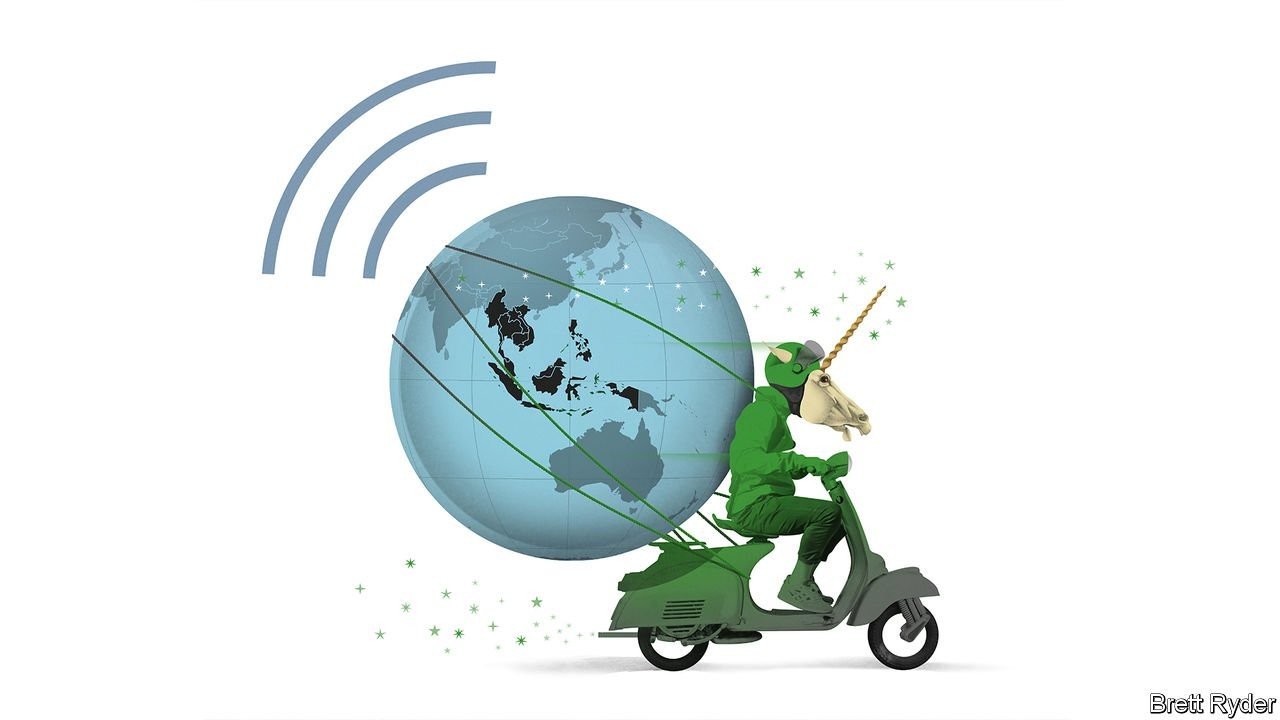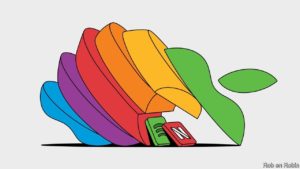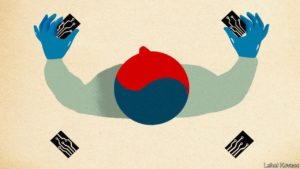https://www.economist.com/node/21800357?fsrc=rss%7Cbus
WHEN UBER came to South-East Asia, the Silicon Valley ride-hailing giant coaxed customers into cabs with free ice cream, a tactic it had deployed in Western markets. Grab, a local rival based in Singapore, plied riders with durian, a pungent tropical fruit that repels many Westerners but is beloved of people in places like Indonesia, Malaysia and Thailand. GrabDurian, as it called the effort, delivered several varieties of the fruit (as well as desserts made from the stuff). After years of brutal rivalry Grab acquired Uber’s South-East Asian operations in 2018. The tale lives on as a lesson for doing business in the region, which is home to nearly 700m people. Digital services such as ride-hailing and food delivery can thrive—so long as they adapt to local conditions.
Now it is Western investors who are salivating. In the past year South-East Asia’s internet-startup scene has got hotter than Thai chilli peppers. The market capitalisation of Sea, another Singaporean group that listed in New York in 2017 (and whose name alludes to the shorthand for South-East Asia widely used in the region), has quintupled in the past year, to a mighty $125bn. On April 13th Grab said it would go public on New York’s Nasdaq stock exchange by merging with a special-purpose acquisition company (SPAC). The deal values the company at nearly $40bn. Gojek, an Indonesian ride-hailing group valued at more than $10bn, could merge with an e-commerce firm called Tokopedia, before also considering listing via a SPAC in New York. Traveloka, another local unicorn (as unlisted startups worth $1bn or more are known), is reportedly in talks to list in New York via a SPAC. All told, the region’s half-dozen biggest internet darlings are worth nearly $200bn.
Wall Street, in other words, has finally woken up to South-East Asia’s great promise. The region is more populous than the European Union or North America. Its economies are growing fast. Wealthy, English-speaking Singapore at its heart is a global financial centre, with all the bankers, lawyers, consultants, admen and creative types that a modern firm needs. Critically, American and Chinese tech giants have a patchy record of coping with the region’s archipelagic geography, potholed roads and unbanked masses. Besides Uber’s abortive foray, China’s Alibaba has struggled to turn around Lazada, a regional e-commerce firm it bought in 2016. Meanwhile, local internet firms have thrived. As they grow they will face another challenge: bumping into each other.
The South-East Asian tech firms began in their own separate niches. Sea started out in gaming. When Grab launched in 2012 it was a taxi-hailing service in Malaysia. Gojek gave out smartphones to Jakarta’s moped drivers (known as ojek), who could then cut through the Indonesian capital’s epic traffic jams to bring mangoes, a manicurist or any other product or personal service offered by merchants on its platform to consumers. Traveloka specialised in airline bookings; Tokopedia was a digital marketplace.
All have since expanded, evolving towards becoming “super-apps” with parallels to those run by Alibaba and Tencent, China’s biggest internet firms. Grab is present in eight countries and in addition to rides offers food delivery, mobile payments, insurance, investments and health advice. Last year it launched corporate services such as fraud detection, digital maps and advertising. This year it plans to start setting up a digital bank in Singapore. Tan Hooi Ling, its co-founder, says that the firm is “like Uber, DoorDash [an American food-delivery app] and Ant [Alibaba’s financial-technology affiliate] all wrapped into one”. Gojek, which now offers a similar suite of services, last year bought a large stake in an Indonesian bank. The co-CEO, Kevin Aluwi, also sees similarities between his firm and the Chinese super-apps. “We are a little bit of all those companies in some ways,” he observes.
As Grab, Gojek and the others continue to grow they will still have to grapple with some of the problems that have dampened the spirits of the foreign titans. Until roads, transport links and communications networks improve, many of the region’s consumers will be too expensive for the tech firms to reach profitably. Nirgunan Tiruchelvam of Tellimer, a broker specialising in emerging markets, notes that the logistical nightmare of delivering online-shopping baskets to Indonesia’s 6,000 inhabited islands is vastly different to e-commerce in China, which has world-class infrastructure, let alone the West. What is more, much of the population will remain poor for years to come, with little discretionary cash to spend on online shopping and investment products.
Even if the upstart digital champions surmount these obstacles they will increasingly face one another. As their offerings broaden they will inevitably begin to overlap. Grab and Gojek already compete for the same customers in areas from ride-hailing to finance. In Indonesia, by far the biggest market, they are burning through cash as they fight over customers in markets where switching costs are low. Neither has turned a profit. Grab’s gross operating loss narrowed in 2020 but still amounted to $800m.
Sink or swim?
High growth means investors are tolerant: Sea’s revenue expanded by 101% last year and it makes money on its preferred measure of profit, thanks to its gaming business. Grab has told investors that it expects to break even by 2023. Mr Aluwi of Gojek sees enough room for several successful firms. “I don’t think this is a winner-take-all market,” he says.
Yet to justify the unicorns’ sky-high valuations, foreign backers may be assuming otherwise. Since 2015 venture capitalists, tech groups (including Alibaba and Tencent, as well as Google and SoftBank) and Wall Street veterans (such as KKR, a private-equity behemoth) have ploughed $26bn into the region, according to Dealogic. Grab’s SPAC is backed by, among others, BlackRock, the world’s biggest asset manager. Some of these investments may leave a bitter aftertaste. But given the region’s potential, others are bound to end up tasting as sweet as a ripe durian.■
This article appeared in the Business section of the print edition under the headline “SEA of opportunity”

















